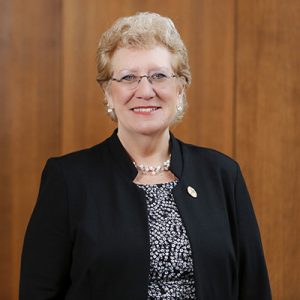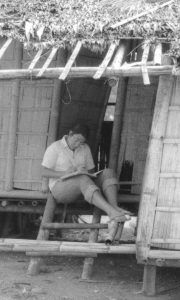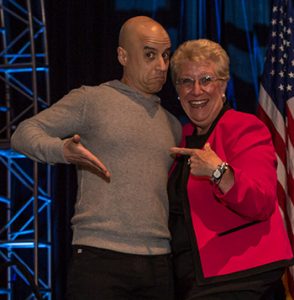Long-Time PA Leader Josanne Pagel Shares Motivations and Career Journey
In Conversation with Andrea Lowe
December 20, 2019
 Josanne Pagel, MPAS, PA-C, DFAAPA, AAPA past president, recently shared her thoughts about her career journey with AAPA’s Andrea Lowe, MHA, PA-C.
Josanne Pagel, MPAS, PA-C, DFAAPA, AAPA past president, recently shared her thoughts about her career journey with AAPA’s Andrea Lowe, MHA, PA-C.
Andrea Lowe: Tell us about your journey to becoming a PA.
Josanne Pagel: It was an unusual path. I’ve been practicing for over 40 years now. I was the first person in my family to attempt to go to college – I took it on, paid for it myself. I had been interested in medicine since fourth grade; I wanted to go into medicine and I wanted to go overseas. I was passionate about working in a developing nation. My focus was on being a physician until I ran into a person who was teaching in the surgical PA program. He invited me to come and observe him and I was hooked. I decided to become a PA because of that exposure.

After I graduated, I went to the Philippines with the Peace Corps. When I came back home to Ohio, although PA laws were terribly limiting, I eventually found a job and made it what I could. I was working in the inner city, taking care of underserved women. I would go out in the communities, talk to teenage girls, and I tried to empower them to take care of themselves. It wasn’t an official PA position at the time (early 80’s), but it was so gratifying. It was during this time, I saw that a community hospital was starting an open-heart program. They liked that I had volunteered with the Peace Corps and asked me to join their team. It was a brand new team: me and a surgeon, and I ended up working there for 12 years. That’s where I really got involved in leadership – the hospital wanted to organize PAs and they asked me to be a manager. Only five years after graduating from PA school, and I was a manager! I was doing scheduling, hiring, and while there grew the population from three to 32 PAs.
After 12 years, I went to work in a family practice with just one other physician. Since I had management experience, I helped with the day to day operations. The physician and I really balanced each other and brought different skills to our patients. Through the family practice, I met a psychiatrist who was interested in the PA profession and how PAs might be able to help him. I ended up moving to his office, and was able to show the value of PAs. Unfortunately, the practice was downsized in 2003, and that was a tough time to be out of a job in Ohio. I was out of work for almost six months, and was applying for clinical jobs at the Cleveland Clinic. Eventually a hiring manager said: ‘You know, I’m thinking about starting a new position here – a manager for PAs. Our PAs have no direction, we don’t even know who they are, would you be interested?’ After five interviews, I got the offer. I accepted it and never looked back.
Honestly, the first 30 days were horrendous. They put me in a basement, without a phone or a computer, and gave me a binder with hospital policies, a map, and a list of the PAs who worked at the clinic. I seriously thought about quitting when I was asked how things were going. And I said, ‘Well, it sucks.’ She asked me why, and I said my manager wasn’t helping me, I didn’t have tools I needed, and I wasn’t set up to succeed.
She made one phone call, and said: ‘You now report to me.’ And that was the moment everything changed. She took my position from a manager to director, and then to an executive director position. Together, we made Cleveland Clinic into a great place for PAs to work. We’ve won the Employer of Excellence Award and today we have over 800 PAs working here. My journey has been a roller coaster. When you’re on the way up, it’s the highest high you can experience. When you’re on the way down, it can be a very low experience. You really just have to preserve and know that the lows do not last and another high is on its way.
[Is your workplace an Employer of Excellence? Learn more about the program and apply today!]
AL: I think that is a great example of why persistence and being consistent is so important. What’s been the most rewarding experience you’ve had as a PA?
JP: The Peace Corps had a huge impact on me. I was the second-youngest person to ever enter the Peace Corps. I’d never left my backyard, never been on a plane. I only got the opportunity because I was a PA. I met wonderful people and look back on it as one of the most incredible experiences of my life.
But the most rewarding aspect of my career, besides changing patients’ lives, is being available to mentor PA students and pre-PA students. I love talking to future PAs – they’re so excited about what their path could be, and I feel that giving back to the next generation of PAs is why I am here. I can help all these pre-PAs and PA students have an incredible career. I can explain what I have done in my own career to show them that the sky is the limit for future PAs! On my journey, I never had any doors opened for me, so, the biggest reward of my career is that I am able to open doors for others.
AL: We all benefit from others who help us at various points in our careers, as you and I are now able to do with future PAs. Who’s been your most meaningful mentor? How did they help you?
JP: I have had two amazing mentors. Bob Van Bergen is the first, he was the cardiothoracic surgeon I worked with for 12 years. He taught me to be a very patient teacher. He was so patient with me and taught me technical skills, customer service skills, how to support colleagues, and how to be a part of a team.
And then, Cynthia Hundorfean, the woman who became my supervisor at Cleveland Clinic and my partner in advocating for the PA profession there. Her mentorship showed me that advocacy is a 24/7 job. Watching her, I learned that you never stop advocating for everything you want to improve. You advocate for your life, family, the profession, and the PAs in the Cleveland Clinic family. She was tireless and taught me that advocating for others is really a gift that you give them. That is one of the most valuable lessons I’ve learned in my career.
[Find your mentor — or offer your own advice and opinions to someone else — with AAPA’s Mentor Match.]
AL: As a PA, I find that part of my job – no matter the position – is educating others. Have you found that to be true as well?
JP: Absolutely. It goes back to what Cindy taught me, to always be advocating. With Cleveland Clinic leaders, even some of my direct reports, I’m always trying to help them learn the system, how PAs contribute to patient care and to understand the value of PAs.

AL: Your many roles are impressive – including those with AAPA! What was your experience as AAPA president like for you?
JP: I looked at being president as a service to the organization that I love so much, that’s done so much for the PA profession. I wanted to leave the organization in a better place than when I started and I think we did that. I loved traveling, meeting other PAs, getting to know the AAPA staff. Being involved at the national level is hugely beneficial. The connections, the resources, the relationships I was able to develop while on the Board of Directors are invaluable. Not only was it personally rewarding, I got to help PAs and PA practice throughout the country.
AL: OK, final question. What advice do you give to other PAs or PA students?
JP: First, just say yes. Even if you’re a little nervous, trust yourself that you’ll figure it out. Admit when you don’t know something; don’t ever be afraid to say you need to look something up. People will respect that. Get involved. Maybe look for a volunteer committee opportunity that broadens your horizons and gives you a wider view of healthcare. You can do anything you want to do. Any PA can be an executive director. And finally, find balance. I have a master’s in Divinity, I perform weddings and other services. That’s a real love for me, and having something that I love outside of the PA profession makes me a better PA and a better leader.
Josanne Pagel, MPAS, PA-C, DFAAPA, is currently the Executive Director of PA Services at Cleveland Clinic. She served as AAPA’s President and Chair of the Board in 2016-17. She can be reached at [email protected].
Andrea Lowe, MHA, PA-C, is director of AAPA employer strategy. She can be reached at [email protected].
You May Also Like
One Interview Tip I Would Give to All PAs
New PAs: Ask Questions and Know Your Value
Find Your Passion at Any Stage of Your PA Career
How to Be A Good PA Colleague
Thank you for reading AAPA’s News Central
You have 2 articles left this month. Create a free account to read more stories, or become a member for more access to exclusive benefits! Already have an account? Log in.



